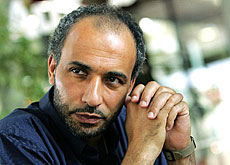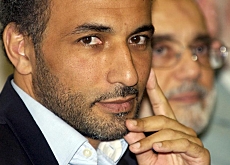Ramadan goes on the offensive against visa ban

A Swiss Muslim intellectual who was prevented from working in the United States tells swissinfo why he has put his name to a lawsuit against Washington.
Tariq Ramadan is supporting a suit by a leading US civil liberties group, which argues the government is using anti-terrorism laws as “instruments of censorship”.
Ramadan accepted a post at Indiana’s Notre Dame University in 2004, but soon afterwards had his visa revoked by the US authorities, which meant he had to resign the post.
The American Civil Liberties Union (ACLU), which filed the suit last week, claims Ramadan’s visa was revoked under the US Patriot Act, which refuses entry to people who are suspected of supporting or defending terrorism.
In a statement, it argued that Ramadan had never supported terrorism and accused the US government of barring people for ideological reasons.
The ACLU also said the move also infringed the first amendment of the US constitution governing freedom of expression.
The lawsuit was filed on behalf of several prominent academic organisations, including the American Academy of Religion, and the PEN American Center, which is headed by the writer Salman Rushdie. Ramadan is named as a plaintiff.
US Secretary of State Condoleezza Rice and Secretary of Homeland Security Michael Chertoff have been cited as defendants.
No explanation
Commenting on the lawsuit, Ramadan told swissinfo that he had never received an explanation as to why his visa had been revoked.
“My record is clear… I’m even working in a task force [on the roots of youth extremism] in Britain and the French government is saying they know there is no connection between me and terrorists,” he said.
“So the only cause for the revocation is my political thoughts and it seems to be an ideological ban, it has nothing to do with terrorism.”
Ramadan is the grandson of Hassan-al Banna, who founded the prominent Islamic movement, the Muslim Brotherhood, in 1928.
Accused of supporting attacks in Israel and Iraq, Ramadan has publicly condemned the September 11 and London attacks and says he is against the taking of innocent life.
The Swiss academic has a popular following among Muslims in Europe, especially in France. But he has been banned from Muslim countries such as Saudi Arabia, Egypt and Tunisia.
Revoked
Ramadan said that after his visa was revoked he went twice to the US embassy in the Swiss capital, Bern, where he says he was questioned by the US authorities about his political views. No visa was forthcoming and no explanation given.
Ramadan says that as far as he is aware, no one has filed such a lawsuit before. But he says that it is not just about him, as it is “very dangerous for the future of the US” to ban people from entering the country for ideological reasons.
The academic, who currently lives in London and is a visiting fellow at St Antony’s College at Oxford University, said he expected answers, at the very least.
“We are using the rule of law and democracy in the US, so at least we expect an answer as to why they are preventing me from entering the country and on which basis,” he told swissinfo.
“If its only political thoughts… that [portends] a risky future for the US and I don’t know what it’s going to happen. But after the last year, in which we saw that the Patriot Act was criticised by the Americans themselves, I really think that there is hope here.”
The Department of Homeland Security and the State Department has so far declined to comment on the lawsuit, according to reports.
swissinfo
Tariq Ramadan is currently visiting fellow at St Antony’s College, Oxford.
His maternal grandfather is Hassan al-Banna, the founder of the Muslim Brotherhood in Egypt.
His father, Said Ramadan, fled Egypt due to the persecution of that organisation, and settled in Switzerland.
Ramadan studied philosophy and French literature and has two doctorates, one in Philosophy, and the other in Islam.

In compliance with the JTI standards
More: SWI swissinfo.ch certified by the Journalism Trust Initiative











You can find an overview of ongoing debates with our journalists here . Please join us!
If you want to start a conversation about a topic raised in this article or want to report factual errors, email us at english@swissinfo.ch.